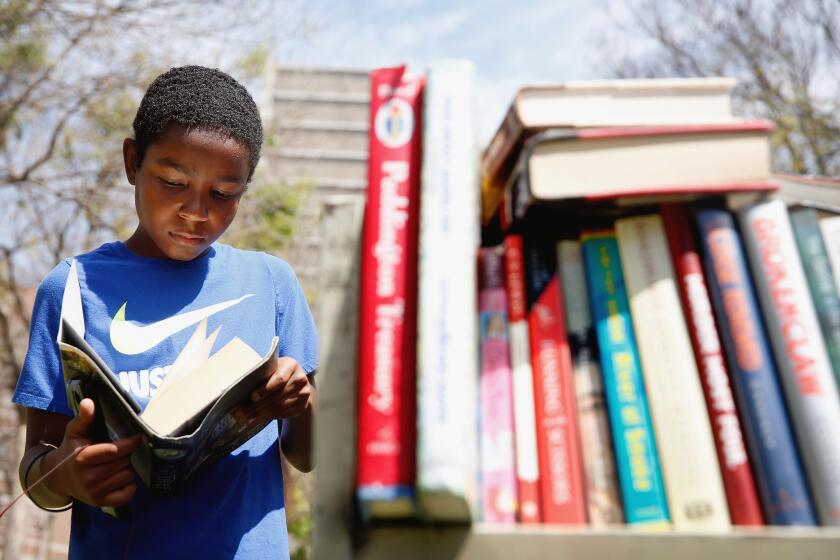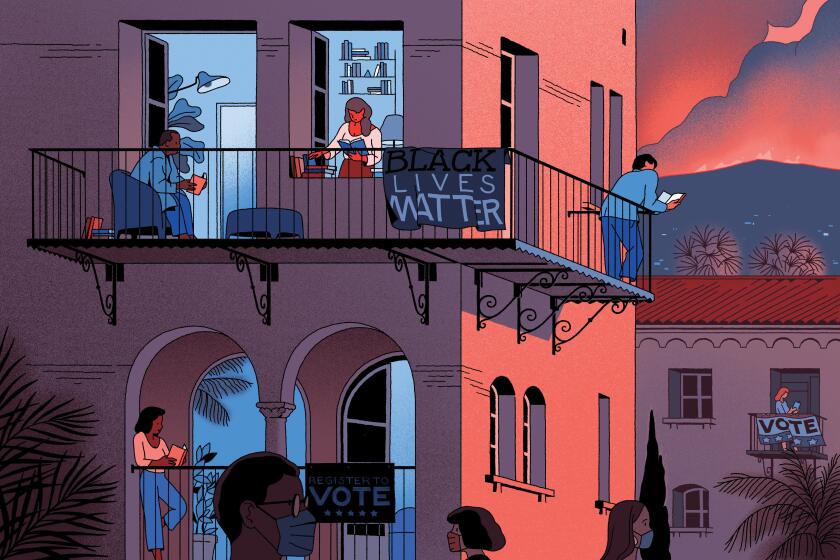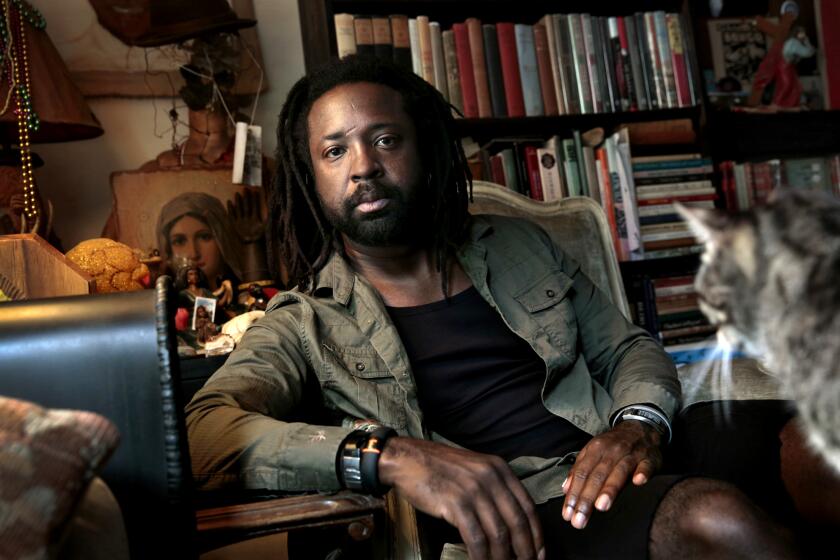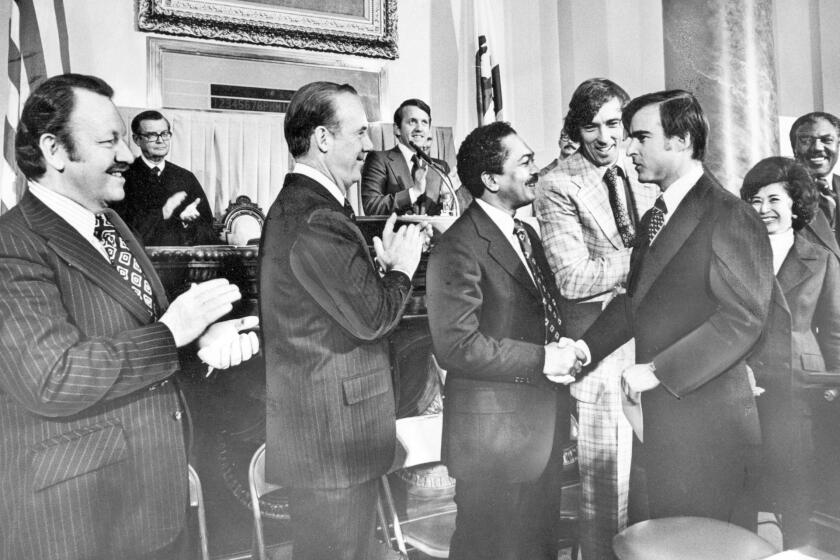How Pico Iyer found L.A.’s beating heart at the L.A. Times Festival of Books
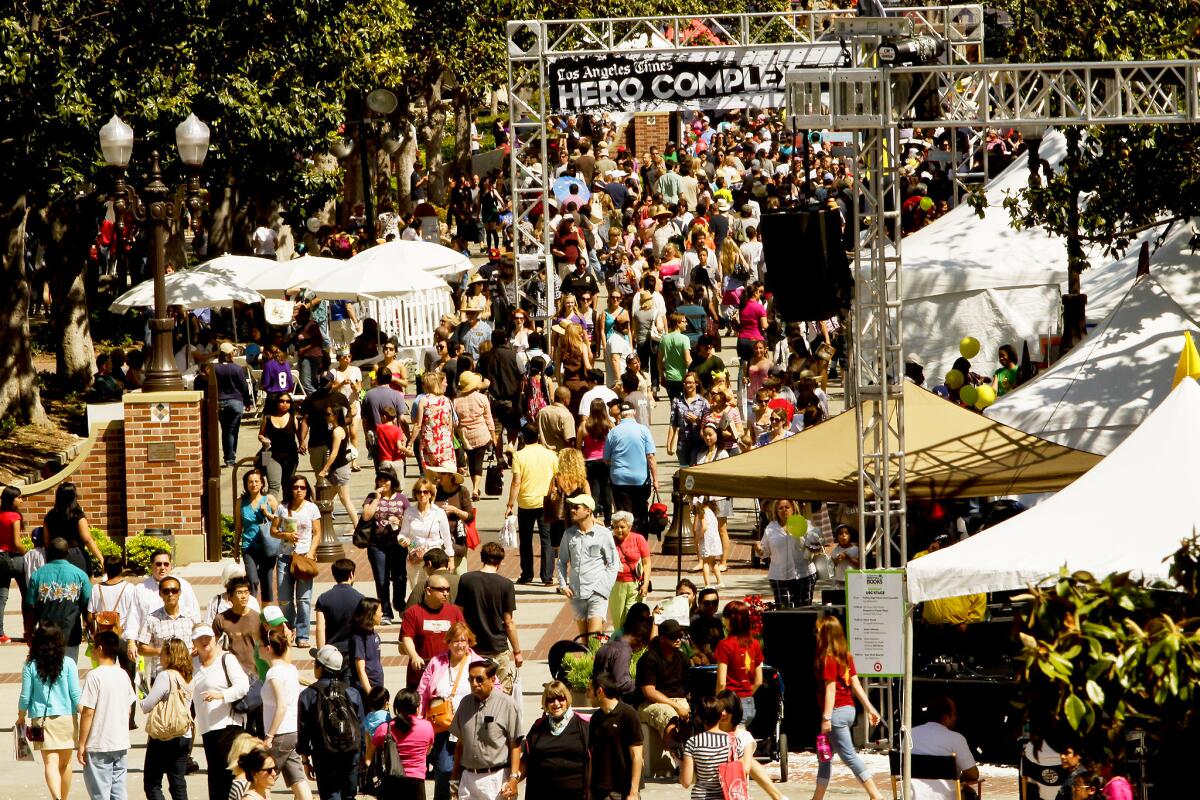
- Share via
Los Angeles is the city without a heart, we used to hear when I was growing up in England, few of us having come within 5,000 miles of California. Seventy-eight school districts in search of a center, a desert car culture in which every last soul is locked inside her own four doors, a teenage wasteland: The clichés came streaming in on us as we stood in the rain at bus stops in chilly Oxford, on our way to another unheated basement.
Of course, we all greedily devoured the pictures radiating out from L.A., but even they confirmed our sense that it was the City of the Image, home of the two-dimensional. Yes, the metropolis might have inspired weirdly alternative realities from Thomas Pynchon and Joan Didion’s passages of dissociation along the 405, but really it was, we assured one another, Disneyland writ large. Yes, we were secretly transfixed by the mean streets of Raymond Chandler — nothing seemed to have happened in Oxford since 1555 — and, later, the tanned bodies of “Baywatch,” but we told ourselves that even those who loved and lived in the city of fallen angels described life there as performance art. “In Los Angeles it’s hard to tell if you’re dealing with the real true illusion or the false one,” wrote the ultimate L.A. woman, Eve Babitz.
Reputations have a longevity that real life might envy, so even today I know that my neighbors in Japan, my cousins in India, see Los Angeles very often as the place where ideas take a breather and a book is rough material for a treatment. If I could invite them over for a single weekend to dispel such secondhand images, it would be the brilliant April days when the Los Angeles Times Festival of Books explodes across the city.
This year, the 25th such festival will be held in the form of 25 virtual events, broadcast every day starting Oct. 18. Appropriately enough for this year of loss, the great Southern Californian rite of spring is being held in autumn. As such, it joins only a handful of years in more than two decades during which I haven’t cleared my calendar out months in advance to be there. Presenting a book at 18 of the first 20 festivals, I came to see it as the one time in the year when my faith in words — in democracy, in diversity, in openness itself — got a boost, precisely by overturning everything I had assumed of L.A. before I ever saw it.
The schedule unveiled Thursday also features Ayad Akhtar, Marlon James and actor Henry Winkler. The online festival — 25 events marking 25 years — begins Oct. 18.
A writer these days is paid — or, at least, encouraged — to spend most of his time not writing. Instead, he babbles about books he’s hoping to write and masquerades as the unseen being who’s usually, by definition, alone at a desk. I’ve spent much of the last 30 years flying to literary festivals everywhere from Shanghai to Bogotá and Wellington to Bhutan. Last year alone, in quick succession, I found myself at such gatherings in London, Belfast, Vancouver, Toronto, Berlin, Nashville, Singapore and Hong Kong.
Many of us know how such events play out. Groups of book-club veterans assemble to see in person their charming heroines while more pointy-headed types take notes on yet another discussion of auto-fiction. On comfy seats in big auditoria, writers pretend that the 200 souls in front of them represent the world. As a frequent audience member myself, I relish looking around to be reminded of how many others are thrilling to Dinaw Mengestu’s explorations of exile and Emma Cline’s unsettling evocations of young girls loose in the West.
The Festival of Books is different in part because it’s at least as festive as it is bookish — and the seats often aren’t so comfy. All of L.A. County seems to be there, as lovers of Octavia Butler bump up against readers of Héctor Tobar. Kids are carrying balloons on a family outing in the sun, and large groups are heading with delighted shouts toward the En Español Stage. Music is blasting from another area and some cheerleaders are strutting their stuff over there, while crowds throng the stalls from Vroman’s and the Traveler’s Bookcase and get to see their favorite KCRW or KPCC hosts in person.
Inside the halls, meanwhile, are wide-ranging chats that honor L.A.’s status as a home to world-class universities, a capital of dreams for people from everywhere and a city that produces presidents (as well as their fiercest opponents). I’ve seen Oliver Stone hold forth on our political landscape and Jared Diamond talk about nearly everything in human existence. Wherever I turn, there are Spanish-speaking writers and considerations of Southeast Asia that I’d seldom find in Auckland or London.
Perhaps no other medium has better helped us process 2020. Our fall books special brings you the books and authors who’ve helped make sense of it.
Yet, crucially and essentially, the festival is an outdoors celebration in the usually stainless mid-April sunshine, where for once Baldwin Park and South Central and Brentwood and Van Nuys seem to come together. Just before the first Festival of Books, in 1996, I’d been living in and around LAX, taking the airport to be a model of the global city of the future. I watched newcomers from Iran, Guatemala, Tibet and China stream into the arrivals hall, only to head out into the daylight and get into cars. And from inside those cars, Koreatown hardly seemed to touch Santa Ana, and Compton and Thai Town belonged to parallel universes.
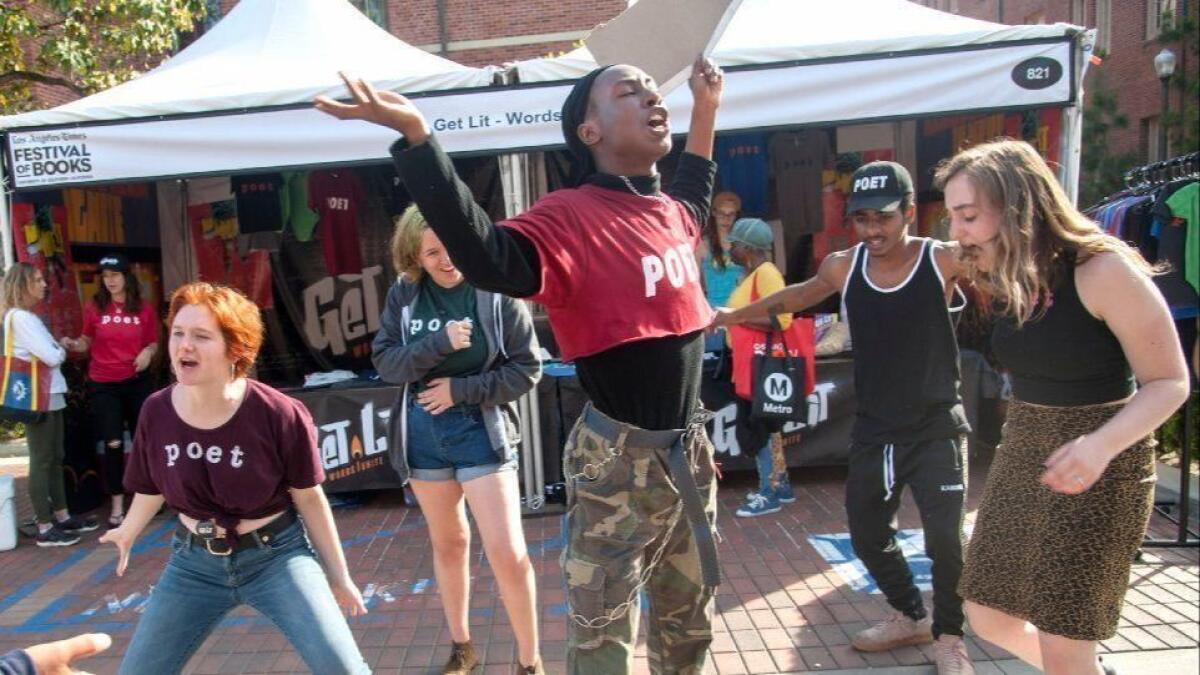
A few months later, at the festival, I saw everyone released from their vehicles and mingling all around me, freeing me at last from the latest L.A. cliché. The city may indeed be spread out in a way that precludes the braided density of Toronto or New York, but at the festival, everyone’s on foot, sharing the same village green, gathering around the children’s stage or snapping up books about Paul Beatty’s visions of the city, or Cristina Garcia’s. Colors run.
____
L.A.’s enduring advantage over every other city is, of course, its position at the heart of the planetary entertainment industry. So perhaps it’s fitting that the most high-toned and stimulating session I ever attended featured Grateful Dead bassist Phil Lesh delivering deeply literate answers about his memoir to a room packed with 800 Deadheads.
This might not be a coincidence. In my 20s, I used to haunt Dead concerts again and again, not for the music but for a sense of community. Suddenly one was off the freeway and out of the office and in some alternative universe in which people were smiling and things were given away for free and we all had the happily woozy sensation of loving something together. My first week of working in Midtown Manhattan, I hurried to catch the Dead at Madison Square Garden; around me were all the same tunes — all the same fans — but somehow the magic of the Ventura Country Fairgrounds was gone.
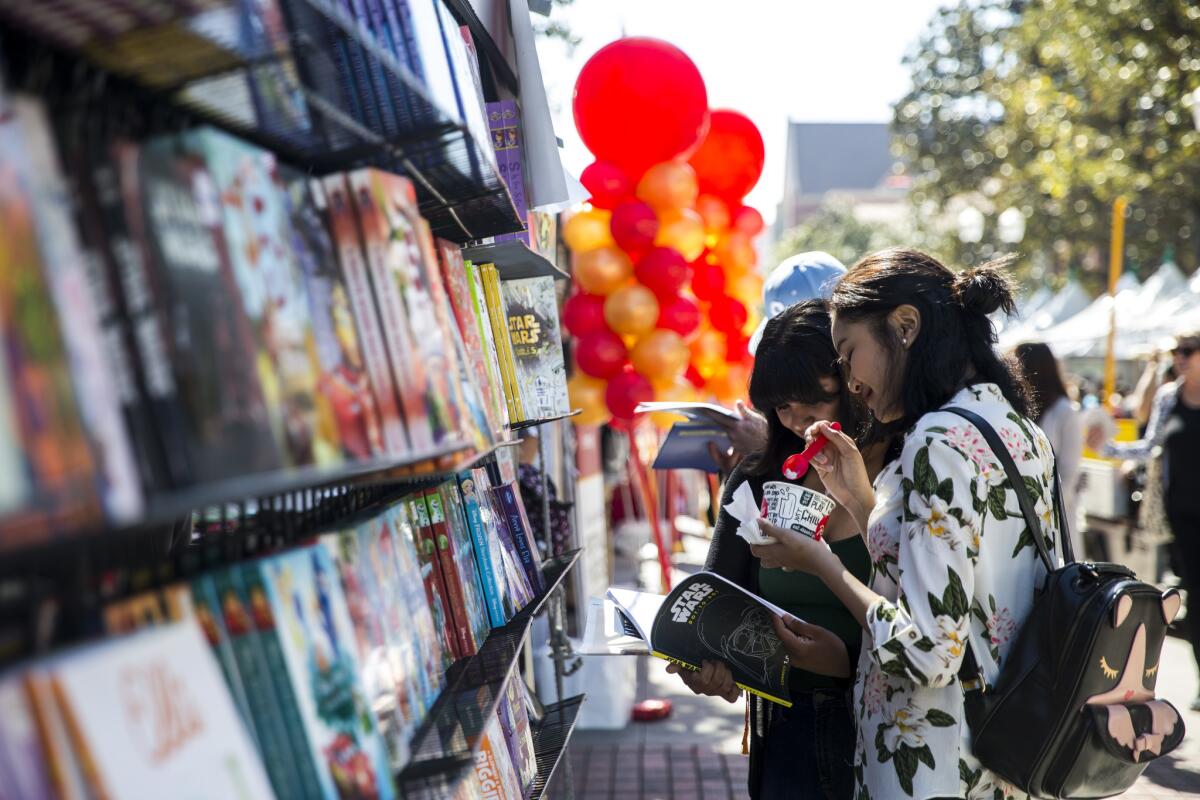
Community! That — or, rather, its seeming absence — lay at the heart of all our cheap jibes about Los Angeles from afar. How could one begin to have a real city scattered across a county more populous than North Carolina (and, in fact, 40 other American states), in which everyone was nosing along those crisscrossing freeways? A city based on mobility is not known for constancy. A life based on fluidity can’t be held up by tradition.
For everyone within 100 miles or more, the Festival of Books is a joy precisely because it has so quickly become such a rich and solid tradition. And as some of us return, year after year, it becomes a very human and specific community too. The festival has given me a new friend in Marc, who brings his high school English classes there. Nora, whom I met while I was signing a book of hers, invites me to her Saturday evening party every festival, a lead-up to her Cuban pig roast on Memorial Day. I even get to see my Santa Barbara neighbor T.C. Boyle, whom I’ve never seen in Santa Barbara, loping back across a lawn from his Sunday afternoon reading.
Marlon James, whose novel “Black Leopard, Red Wolf” pioneered queer fantasy, thanks Mary Shelley and “Moby Dick” for predicting our current crisis.
There are many reasons to read, and the ones I learned about while studying literature in grad school speak for only a few. Books bring us together; I don’t know of many groups that gather to discuss movies or music in the same way. Books put us inside the shoes, the skin, the soul of the Other, something ever more important in our violently polarized times. Books free us from the prison of the self. I like to believe that the Festival of Books honors this by not charging for its events, by offering a wild variety of authors — I’ve seen Ursula K. Le Guin and Kareem Abdul-Jabbar there, Paul Anka and Huston Smith — and by flooding the campus of first UCLA and now USC with 450 authors, 500 booths and sunny diversions on every side.
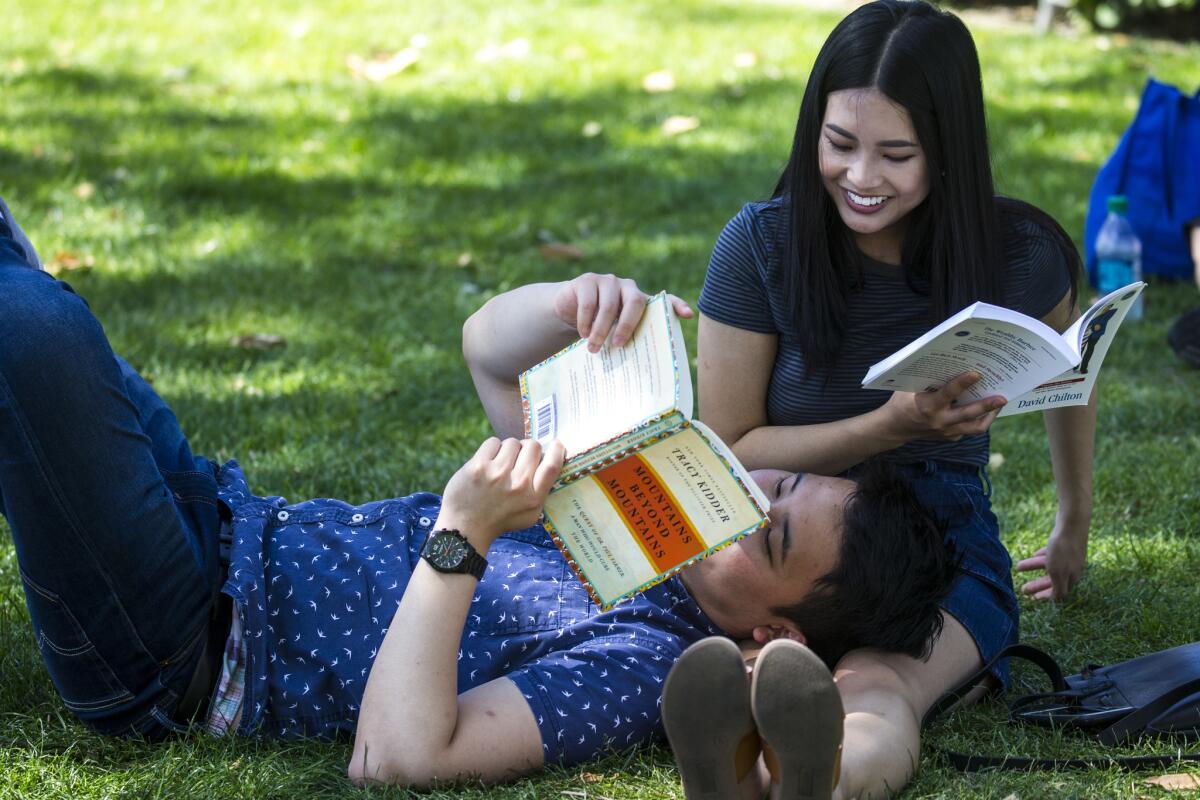
I’m thrilled that the festival will find a way to join us together again this fall even in an age of social distancing: the Year of Zoom has shown me that one can often get an even more intimate sense of an author onscreen than from the far end of a hall. At the same time, as a lifelong fan of the NBA and Major League Baseball, I’ve been stunned at how much their games lose in the absence of a real-life crowd. The beauty of the festival lies in part in the fact of 200,000 people coming out to celebrate a pastime that each of us practices alone.
So I’ll be keen on listening to Laila Lalami, Marilynne Robinson and Jerry Brown over the coming weeks, and celebrating 25 years of unexpected friendships and golden afternoons and rich memories. (How can I forget the time, as moderator, when I asked a question of a former prime minister of Vietnam, only to realize — 30 minutes later — that he’d been waiting 40 years to offer a full answer?) But, as much as anything, I’ll be waiting for next April, and the Aprils to come, to be reminded that conversation, literacy, surprise — humanity itself — might be alive and well in Los Angeles in ways that poor Oxford could never conceive.
Veteran Times journalist Jim Newton’s graceful “Man of Tomorrow: The Relentless Life of Jerry Brown” doubles as a history of postwar California.
Iyer is the author, most recently, of twinned books, “Autumn Light” and “A Beginner’s Guide to Japan.”
More to Read
Sign up for our Book Club newsletter
Get the latest news, events and more from the Los Angeles Times Book Club, and help us get L.A. reading and talking.
You may occasionally receive promotional content from the Los Angeles Times.
